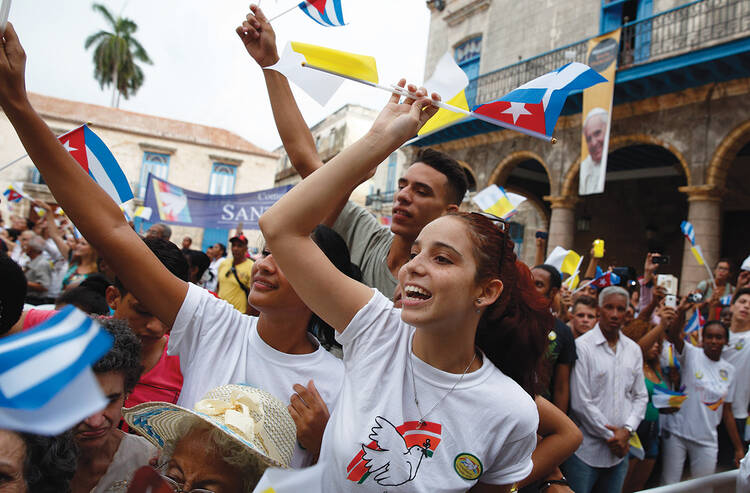Minutes after arriving in Cuba on Sept. 19, Pope Francis hailed “the process of normalizing relations between the two peoples of Cuba and the United States” after more than 50 years of estrangement as “a sign of the victory of the culture of encounter and dialogue” that “fills us with hope.”
He urged the political leaders on both sides “to persevere on this path of peace and to develop all its potentialities as a proof of the high service that they are called to carry out in favor of peace and the well-being of their peoples, of all America, and as example of reconciliation to the entire world.”
In a lengthy welcome speech, President Raúl Castro said he believed Pope Francis’ visit would be “a transcendental and enriching experience for our nation.” By the time the pope departed on Sept. 22, Castro’s expectation seemed well fulfilled.
“Service is never ideological, for we do not serve ideas, we serve people,” Pope Francis said in his homily at Mass on Sept. 20 in the Plaza de la Revolución in Havana. Wearing green vestments, he began by recalling the embarrassing question Jesus put to the disciples who were discussing which of them was the most important. Francis said this question—“Who is the most important?”—is one that surfaces many times during our lives and to which we must respond. Indeed, “the history of humanity has been marked by the answer we give to this question.”
Jesus provided an answer that opened “a new horizon” for the disciples then and for us today. He sets before us “the logic of love” that brings with it “a mindset, an approach to life, which is capable of being lived out by all, because it is meant for all”, and is “far from any kind of elitism,” even of a spiritual kind.
Pope Francis concluded his first full day in Cuba on Sept. 20 with an inspiring encounter with Havana’s young people in a park near the city cathedral. Abandoning his prepared text and indifferent to the soaking rain, he urged Havana’s young to remain “dreamers.”
He told them that a Latin American writer said we have two eyes: one of flesh and one of glass. With the first we see what we see, but with the glass we dream. “We need to have the ability to dream. A young person who does not have this ability is closed in on himself or herself.”
He urged them: “Dream that with you the world can be different. Dream that if you give the best of yourself, you’ll help to make the world a different place. But please dream, and dream big. And share your dream with others!”
One of the event’s speakers had talked about the differences that exist among Cubans because of ideologies and religion. Pope Francis urged Cuba’s young people to seek the things that unite them. “Let’s dare to talk about what we have in common, and then we can talk about the differences,” Pope Francis said. He urged them to commit themselves to cultivate the culture of encounter.
The pope was by now very wet from the rain, but he had one more word to share: hope. He told them, “Young people are the hope of a nation; they are its future.” He said hope knows how to suffer, to turn a project into reality.
He then asked them to pray for him, and “if you are not a believer, then please wish me well. And I will pray for you!” He then gave them his blessing, and to a mighty cheer from the young people he walked to the popemobile—drenched!








